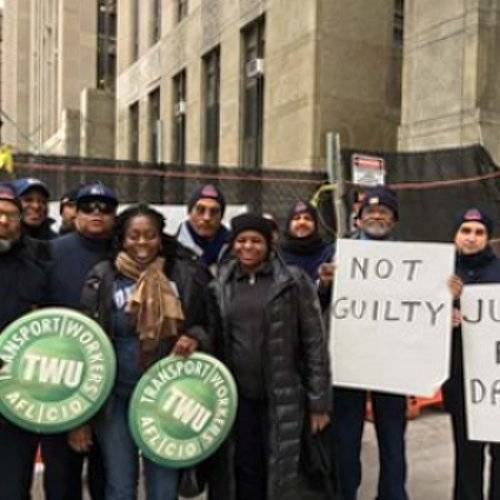New York: Metro Transit debt makes profits for Wall Street

TWU Local 100 members outside Manhattan courtroom after judge posthumously cleared union comrade Darryl Goodwin for false cop charges against him.
New York — The Metropolitan Transit Authority here is on a collision course for a financial crash. It just approved a $1.9 billion capital project to build a third track for the Long Island Railroad, which mostly benefits suburban commuters and the bourgeoisie.
Some MTA board members at its Dec. 13 meeting feigned concern about approving yet another project that may run over cost projections and require borrowing big money. While board members may publicly fret about rising debt to the banks, they aren’t actually fighting on behalf of the working people who use the system.
The Second Avenue Subway project broke ground in 2007 with a projected cost of $3 billion. A decade later, it has now sucked up $11 billion — and construction of the line’s second phase hasn’t even begun.
These overruns require the MTA to take on more debt. The public agency already owes almost $40 billion to the banks, and has only been making interest payments, instead of paying off the principal. The MTA — with loose fingers in its wallet — might very well be the best customer the banks could wish for.
The first subway line in New York City was built in 1904 by capitalist bosses to transport workers who were living farther and farther away from the expensive city center where businesses were located.
But not so much good-paying work exists anymore in the city. The evolution of capitalism demands that work be automated to increase “productivity” — yielding profits from more work by fewer workers.
“The bosses really don’t need tens of millions of workers anymore,” said Renée Imperato, a disabled veteran and organizer with the People’s MTA. “Why feed us, why educate us and why house us?”
And why transport us?
People’s MTA fights for riders and workers
Capitalism leaves our class with a stark future. That’s why PMTA has sprung up. The original members of PMTA, under the banner of NYC Workers Defense Committee, got involved in struggles around transportation in May. Transit worker Darryl Goodwin had been harassed and wrongfully arrested on May 16 by an on-duty cop, one of hundreds hired by the MTA. The agency supports “broken-windows” policing — the theory that arresting people for minor issues like fare jumping will deter major crimes. However, such wrong thinking will not fix what’s wrong with the trains.
Goodwin died Aug. 16 before his trial. His union comrades feel strongly the stress of the arrest contributed to his declining health. Goodwin’s good name was restored Dec. 15, after pressure by Transport Workers Local 100, when a Manhattan judge posthumously dismissed criminal charges against him.
While advocating for Goodwin at MTA board meetings, WDC members encountered other militants. Seeing the activism around transportation, WDC members realized they needed to broaden their mission and create a united front. That was how the PMTA was born. Over the summer, the group’s activities included responding to massive delays and derailments in the subways.
Determined to fight for the working class, PMTA’s demands include reduced and free fares, the addition of elevators in every subway station to comply with the Americans with Disabilities Act, more buses and trains per hour, an end to racist policing, and rights and justice for transit workers. While access to affordable transportation is being taken away from New York City workers, Trump signs a bill to spend $700 billion for more wars.
Tony Murphy, a PMTA organizer, sees larger forces at play as the 113-year-old subway system crumbles. He told WW: “The MTA board is proving itself capable of only funneling money to Wall Street, the same class forces that are getting billions in tax breaks from the Trump administration.” Murphy added that the MTA board needs to be replaced with a board of workers who ride and operate public transportation.
The PMTA has rallied in front of MTA headquarters monthly before heading to the 20th floor of 2 Broadway in Manhattan to voice demands to MTA board members. The next scheduled board meeting is 10 a.m. on Jan. 24.
Join us in supporting all workers, without whom this society could not function. A public transit system should be a service, not a business.
Varughese is an organizer with the People’s MTA.

